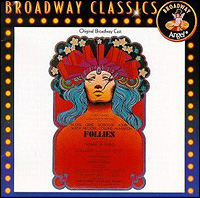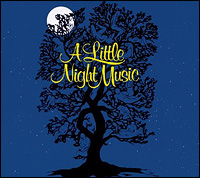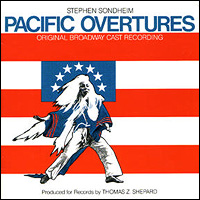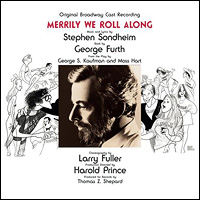*
Our three-part series discussing the original cast albums of Stephen Sondheim musicals — which began in our column of March 14 — focused on his first five shows, beginning with West Side Story in 1957 and continuing through the 1960s. This column discusses his mid-period, from 1970 through 1981. Our next column will continue from there, incorporating various non-Broadway works as well.
| |
 |
|
Which is to say that when they did Company, Sondheim and Prince were long-time friends and colleagues, and Prince had already produced (though not directed) two hit Sondheim musicals. After a remarkable string of six-hits-out-of-seven-musicals, Prince turned his attention to directing. The first four efforts — two for other producers and two self-produced — were all unsuccessful, although one of them was the treasurable-if-unprofitable She Loves Me, which counts as a grand success in my book. Director Prince finally dazzled audiences with the new-style concept musical Cabaret (1966), after which he was just about ready to join with Sondheim for six musicals that changed the world. Or, rather, our world if you'll pardon the expression. The phones didn't ring, the doors didn't chime — what we heard, actually, was a recorded busy signal — but in came Company, and how! One can generalize and say that a brave new contemporary sound rushed into the theatre on that April night in 1970, which would not be all that accurate; the sound of Company had been heard on Broadway for the prior 16 months, and not coincidentally so. Sondheim had more or less championed orchestrator Jonathan Tunick, recommending him to Burt Bacharach for the 1968 hit Promises, Promises. If the use of electronic keyboards, studio-style soundboards and invisible pit singers were similar, the two scores are anything but.
This three-part overview of original Broadway cast albums of musicals by Stephen Sondheim is not intended to analyze his work and art; if they asked me, I could write a book, but the composer most fortunately has written one of his own. Two of his own, rather, the first of which — "Finishing the Hat: Collected Lyrics (1954-1981) with Attendant Comments, Principles, Heresies, Grudges, Whines and Anecdotes" — is scheduled for a late October release. Mr. Sondheim being an incisively analytical observer, this one is sure to keep us occupied — to say the least — through the holiday season and on.
Our stated aim here is to merely mention in passing favored moments of the recordings in question. In Company, as with other albums in this column, the favored moments encompass about 50 minutes worth (which is to say almost the whole thing): Those busy signals and the opening number they lead to, "Company." The wryly-observed "Little Things You Do Together," peppered with a karate exhibition. "Sorry-Grateful," a tempered romantic-ambivalent trio that I can never listen to without getting caught up in the mixed sentiments. "You Could Drive a Person Crazy," a very different sort of trio for Bobby's three girls. "Someone Is Waiting," the second of the beauties of this score. "Another Hundred People," a song of claustrophobic loneliness in a city of strangers with crowded streets and guarded parks where it's impossible to connect even if your service will explain. "Getting Married Today," in which Mr. Sondheim did indeed change the course of the musical theatre, in my opinion, with one sentence: "I telephoned my analyst about it and he said to see him Monday but by Monday I'll be floating in the Hudson with the other garbage." Audiences, suddenly, had to listen in a very different way. "Side by Side by Side," an admirably contrived number leading to that shattering moment when silence follows the hero's tap break. (Was that devised by the composer, as I imagine, and described to the choreographer? No matter; it encapsulates, in one silent measure sans music, the entire show.) "Barcelona," a throw-away number with one of the more unexpectedly explosive first lines I remember hearing (although it's never been so funny as in 1970), and a similarly wonderful final moment. "The Ladies Who Lunch," which I don't suppose needs discussion. And "Being Alive," which caps the whole thing. Funny how that descending five-note figure — first heard in the vamp, then continually as counter-melody — drives the entire song, which by the time they finish is driven indeed. What a glorious ending to the song, and a glorious ending to the show, and a glorious beginning to Broadway's modern new era.
| |
 |
|
Follies is a veritable cornucopia of highlights: The Prologue, highlighted by that ghostly melody on the soprano sax. "Waiting for the Girls Upstairs," intertwining eight characters — or actually four characters, in different eras — into a magical weave. The one-of-a-kind "Broadway Baby," which has never been so fine as when Ethel Shutta — a bonafide Ziegfeld soubrette with featured spots in Flo's Louie the 14th and Whoopee — handily and effortlessly commandeering the spotlight at the Winter Garden. "In Buddy's Eyes," one of the several songs which allows us to watch what turns out to be the disintegration of Miss Sally Durant (with the composer propelling the rhythm with a nervous pulse). "Who's That Woman," another one-of-a-kind number that was propelled by the durable and unstoppable Mary McCarty. The indestructible "I'm Still Here," which we needn't bother to discuss. (I must dutifully assert, now and forever, that I've never heard a rendition so searing as that of Ms. Nancy Walker at a 1973 gala fundraiser at the Shubert, as captured on the CD "Sondheim: A Musical Tribute.") "Too Many Mornings," which seems intended to be a romantic ballad but becomes ever so much more. "Could I Leave You," in which Sondheim breaks out the razor-sharp pencil that was to become one of his most effective instruments and at the same time gives us a foretaste of the power of the Sondheimian waltz. The "Loveland" sequence starts with "You're Gonna Love Tomorrow" and "Love Will See Us Through," which you may call genre pastiche if you like but are actually a pretty complicated mix of two songs for the aforementioned four characters and their ghosts. "Losing My Mind" has always seemed to me the most effective moment, dramatically, in the show; "The Story of Lucy and Jessie" is a bravura spot in the manner of Ira Gershwin & Kurt Weill's "The Saga of Jenny"; and "Live, Laugh, Love" is a nightmarish breakdown in song. (Maybe I'm way off base, but it has always seemed to me that this number is directly inspired, musically and philosophically, by Porgy's banjo song, "I Got Plenty o' Nuttin'.")
Multiple recordings of Follies exist, with the original 1971 album regularly earning demerits due to the rushed-and-ragged recording sessions and the cuts and abridgements necessary to cram the thing onto a single LP. (Paradoxically, the all-important critic of the New York Times headed his review by saying this was "the kind of musical that should have its original cast album out on 78s.") Yes, there are other choices out there, including the admirable cast recording from the 1998 Paper Mill Playhouse production which includes the full score plus cut material, all orchestrated and conducted by Jonathan Tunick. But the 1971 album
| |
 |
|
| |
 |
|
I've decided not to waste any space whatsoever on Sweeney Todd, except to say that if forced (and I mean absolutely forced) to select Sondheim's greatest score — well, I'm not forced so I'll say no more. Some years back I wrote an article called "Sweeney in the Pit with Steve," which recounted a memorable night I spent in the pit of the Brian Stokes Mitchell/Christine Baranski production of the show at the Kennedy Center's 2002 Sondheim Festival. (I was wedged on a stool between the trombones and reeds, Sondheim was more comfortably situated on an upholstered chair next to the piano.) I was never able to find anyone who'd print the piece — it's long — so I eventually included it in my 2009 book "The Sound of Broadway Music." My detailed thoughts on Sweeney Todd can be found there, hopefully available from your friendly local library. (You might want to check out the 2007 On the Record column that discusses the CD reissues of Sweeney Todd and Merrily We Roll Along.)
| |
 |
|
Nowadays, this would have happened at a regional tryout somewhere, with time built into the schedule to make changes; Merrily, actually, has over the years been revised, rewritten and improved. Cast albums of the revised version exist, but I always return to the 1981 album. This is how Sondheim wrote it, initially; and it contains a wonderfully exciting set of orchestrations by Jonathan Tunick. (Tunick would be the first to explain that his orchestrations for Sondheim musicals sound so good because Sondheim's music is so good. Agreed; but he really did an unparalleled job on Follies, Night Music, Sweeney , and Merrily.) Favorite moments: "Merrily We Roll Along," which Sondheim alters as he moves from 1980 to 1955. "Rich and Happy," with the hero at the height of his success but surrounded by a chorus of failure. "Like It Was," a rueful plaint recognizing that everyone "blames the way it is on the way it was, on the way it never ever was." "Franklin Shepard, Inc.", an incisive character study and nervous breakdown-in-song. "Old Friends," a triangular celebration of friendship which doesn't overlook its flaws. (Old friends "don't make demands you can't meet," sez one; "well what's the point of demands you can meet?" sez the other.) "Not a Day Goes By," another beauteous introspective ballad from Mr. Sondheim. "Now You Know," a roller-coaster of a concerted number that glosses over the bad to find good; "I mean, even cream of wheat has lumps," explains the unrequited heroine. "It's a Hit!" a glittering gem which is among my Sondheim favorites. The gentle "Good Thing Going," the hopeful "Opening Doors," and — at the beginning of the friendship and the end of the story — the idyllically pristine "Our Time."
The brick wall that was Merrily We Roll Along served to end the Sondheim/Prince era. They'd gone, to borrow a phrase from Mr. Hammerstein, about as fur as they c'd go. But there was plenty ahead for Sondheim (and Prince as well). We will continue our survey through the Sondheim shelf in our next column.
(Steven Suskin is author of the recently released updated and expanded Fourth Edition of "Show Tunes" as well as "The Sound of Broadway Music: A Book of Orchestrators and Orchestrations," "Second Act Trouble" and the "Opening Night on Broadway" books. He can be reached at Ssuskin@aol.com.)
*
Steven Suskin's updated and expanded fourth edition of "Show Tunes" is available at PlaybillStore.com.










